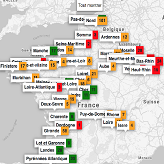ICUBAM: Algorithms for health


One of the main challenges of the health crisis caused by the COVID-19 epidemic was and still is the availability of intensive care unit (ICU) beds and the need for invasive mechanical ventilation (IMV). To address these issues, a team of doctors and researchers developed ICUBAM (ICU - Bed Activity Monitor), an operational tool to monitor and visualize the availability of intensive care beds in real time. Conceived by a resuscitator, Dr. Kimmoun of Nancy's CHRU, and designed with a team coordinated by Julie Josse, Professor at the Applied Mathematics Center of the École Polytechnique* and member of the XPOP Inria research team, ICUBAM was launched in the Grand-Est region and quickly spread throughout France. Today, 130 intensive care units in 40 departments use this device.
Created in less than a week and open-source, ICUBAM has the particularity of bringing together an interdisciplinary team of resuscitators, engineers, researchers, statisticians, physicists and computer scientists. They worked on this concept, from data collection to analysis and communication of results in real time to meet operational needs in an emergency context. This approach has been carefully thought out to take only a few seconds for the doctors who inform bed occupancy twice a day.
But ICUBAM's approach does not stop there. In fact, in addition to reporting occupancy, the team is working on an objective of predicting the shortage of beds by anticipating needs at 1, 2, 5 or even 7 days ahead.
Thanks to an interdisciplinary team from Inria, X and emergency doctors, this project combines a synergistic and unique set of skills ranging from biostatistics to trauma science, machine learning, computer science and data engineering. They thus intend to meet a dual objective: societal to help doctors and patients, but also scientific to efficiently process heterogeneous data from different sources, at different scales of time and space.
> Learn more about the ICUBAM project: visit Inria website.
To go further:
Dr Kimmoun and Julie Josse are also working on a second research project that aims to anticipate the need for ventilators for patients admitted to hospital with automatic learning based on the evolution of symptoms in previously admitted patients.
By establishing a clinico-biological score within 12 hours of admission, they hope to accurately assess the patient's risk of intubation following hospitalization for a COVID-19.
> Also to be read: Julie Josse apply AI to the care of major trauma patients
*CMAP, a CNRS - École polytechnique Joint Research Unit, in partnership with Inria.
 Support l'X
Support l'X